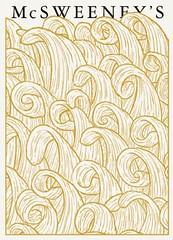The whole concept behind McSweeney's 31 is a pretty fun one: dig up some old forms of literature, toss the ideas to contemporary writers and see what they can come up with.
From an editorial standpoint, I really like the issue. They cover a real wide breadth of styles in a fairly short volume: whore dialogues, Nordic sagas, Socratic Dialogues, pantoums and so on. Each section gives an example, or part of an example for the longer forms, and includes footnotes and marginalia so readers will know what the hell is going on, both formally and culturally.
I don't know if it's because the poems are shorter and didn't have a chance to wear out the gimmick or that poets are just more used to playing with a variety of constraints, but by and large I thought the poets did a better job. From Tony Trigilio's pantoum "Jack Davis"----a wonderful piece on the JFK assasination----to Chris Spurr's funny senryu they are all really strong. The narrative work, by and large, seems to peter out once they get ahold of the form.
But I don't want to make this a bitch session; there were some narrative pieces I liked. Douglas Coupland was a phenomenal choice to play with the Chinese form called Biji. Like a lot of Coupland's normal work "Surrender" mixes narrative, odd facts and rumors into a whole that's both timeless and postmodern. Add to it that it's a parody of reality television, and you have a piece that's not just an experiment in form but also a fun piece of cultural criticism.
David Thomson's stab at Socratic Dialogue by creating a hilarious and philosophical argument between Susan Sontag, Virginia Woolf, Charlie Chaplin and Ernest Hemingway is also fantastic, especially if you have a handle on film criticism. I also wasn't surprised to enjoy Shelley Jackson's take on the Conseutudinary, a unique type of writing for monks that includes instructions on day-to-day activities and religious thought. Jackson's version entitled "Conseutudinary of the Word Church, or the Church of the Dead Letter" is a deep but disturbing examination of semiotics, religion, philosophy and power.
All in all, a fun issue. I look forward to the next one.
Excelsior

No comments:
Post a Comment